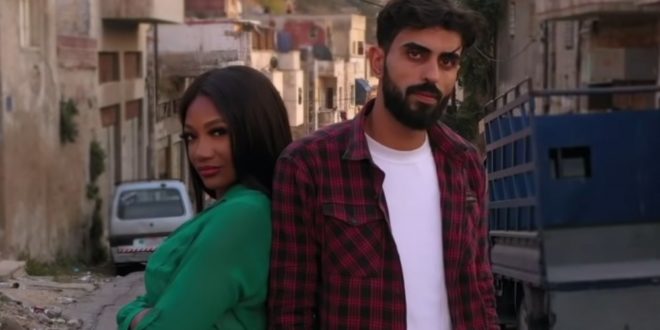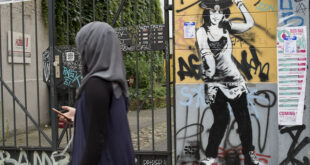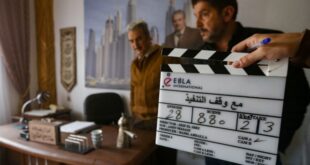The American network TLCs’ 90 Day Fiancé’s casting and storylines have provided its audience with years of entertainment, mostly at the foreign partner’s expense. The reality television industry has grown exponentially throughout the years, thriving on the drama between characters to gain viewership. However, reality television channels, such as Bravo and TLC, are known for taking advantage of the stereotypes of marginalized groups, including immigrants and people of color. This is especially apparent in the show’s latest spin-off series 90 Day Fiancé: The other way, which follows Americans traveling to their partners’ countries to further develop their relationships.
The show has controversially depicted foreigners as ‘backward’ compared to Western society, and Season 2 of the spin-off series was no exception. In it, TLC films the relationship of Jordanian, Yazan Abu Hurira, and Florida native, Brittany Bank Wilson. Throughout the season, viewers watched Yazan and Brittany’s tumultuous relationship unfold in Amman, Jordan. While TLC has misrepresented Arab society in the past, we still watched in dismay as this popular reality show completely misrepresented the city, the people, and the culture that we both cherish.
The show’s portrayal of Muslims and Arabs contributes to pre-existing stereotypes, and arguably, heightens and reinforces xenophobic attitudes in Western societies due to its popularity. The West’s inability to accurately and objectively portray the Arab world is best explained in Edward Said’s seminal work, Orientalism, in which he argues that the ‘orient’ was created by Westerners to deal with ‘the others’ or ‘outsiders’ from foreign countries.[i] This inability to understand the differences and nuances in cultures has resulted in Western media depicting images of Middle Eastern, North African, and Asian countries as barbaric, hypersexualized, and oppressed societies whereas the West is continuously presented as rational and liberal. Driss Ridouani also points out that these Western stereotypes have existed since the Middle Ages, especially during the Crusade Wars and well into the Third Millennium, thus this portrayal of Islam as the “traumatic” other is not novel.[ii]
Xenophobia, defined as “the fear of the ‘other,’ the outsider, including the foreigner who seeks to come to one’s country” is one of the many biproducts of Orientalism.[iii] Xenophobia translates in hostilities towards people of different backgrounds, resulting in discrimination, controversial domestic and foreign policies, as well as wars and genocides. [iv] This form of racism has a history of being embedded in national laws, in the case of the United States, including the Japanese Internment Bill (1942) and the Muslim Ban (2017), amongst others.[v] Xenophobia and Islamophobia, in which prejudice is directed towards Muslims, were particularly heightened by Western societies after the 9/11 attacks and are enhanced by negative stereotypes that lead to discrimination against immigrants and Muslims in social, political, and civic life.[vi]
TLC’s taping and editing of Yazan and Brittany’s relationship highlights common stereotypes contributing to the ‘othering’ of Arabs and Muslims and reinforcing misconceptions about the region and its people. Previous cast members have called out the show's editing as misleading since TLC is known to cut lines and scenes that do not fit into their storylines. It is important to note that Brittany is African American, a community that has been historically, and continues to be, ‘othered’ and discriminated against. Brittany’s race does make her a minority in both America and Jordan, but she still possesses the privileges of being a Western American in Amman.
Amman - The “Deserted City”
A mix of old and new, Amman is a city of four million people with a rich history that has attracted countless people to its sights and monuments. Its newer residential areas in West Amman have provided numerous homes to expatriates and locals alike. Unfortunately, Amman did not escape TLC’s stereotyping, portrayed as a low-income city, or as Brittany called it, “a deserted city”.
While TLC made it seem as though all the scenes were filmed in the old downtown area, we were shocked to see that most of it was actually filmed in other poorer parts of the city. Scenes, such as Yazan’s fish market, were filmed in Wahdet, which is historically a Palestinian refugee camp and continues to be a lower-income and more conservative area of the city. By choosing to only present the poorer neighborhoods of Amman and portraying it as the state of the entire city, TLC failed to show the richness and diversity of the city. Production should have instead filmed in areas where locals socialize, such as the new downtown or neighborhoods with nightlife.
This should not have come as a surprise though, since TLC’s 90 Day Fiancé has a history of filming in lower-income areas causing foreign cities to seem downtrodden and impoverished, further emphasizing the overall image they create of ‘foreign’ cities. TLC has done this when filming in Malaysia, the Philippines, and Nigeria. By painting this picture to their audience, TLC dramatizes the couple’s relationship not only by enhancing the differences in culture but also in geography, thereby contributing to the ‘othering’ of the people living within these cities as well as the cities themselves, presenting them as ‘exotic’ and ‘alien’.
Scenes that Lead to ‘Othering’
Various scenes in the show appeared to have been dramatically edited in order to draw in viewers at the expense of Jordanians and Muslims. Throughout the season, there were many instances where aspects of Jordanian society were misrepresented, and Arabs were made to seem as oppressive and tyrannical.
Prior to filming, Brittany had visited Jordan twice, which theoretically exposed her to Jordanian societal norms. Despite this, in one of the episodes she arrived at the airport with a visible bottle of alcohol in her purse. This angered Yazan, leading him to shout at Brittany and the production crew. The show presented the incident as an example of the ultraconservatism of the Middle East and its men. They portrayed alcohol as forbidden and not socially acceptable in Jordan as a whole. Whereas in reality, locals regularly enjoy Amman’s nightlife including its high-end rooftop bars and dance venues.
TLC’s focalization on alcohol restrictions in the Middle East and the dramatization of people’s reactions was not limited to this season however. In Season 17, Tunisian Aladin was portrayed as an overbearing conservative when he got angry at his wife, Laura, for making wine in their house. That season was filmed in Qatar where there are strict rules pertaining to alcohol. Laura’s actions were not merely rebellious, they were against the law and could have made Aladin face serious consequences. However, Middle Eastern countries do not all share the same laws or practices since it is not a homogenized region. In fact, Tunisia, Aladin’s home country along with many other countries in the Middle East and North Africa, including Jordan, Lebanon, Syria, Morocco, and Egypt, sell alcohol. Aladin was not being oppressive, but rather being put at serious risk. Similarly, Yazan’s anger at Brittany and the crew was likely caused by the real risk this scene might pose to his conservative family’s reputation.
That said, the most damaging scene by far was the one where Yazan’s father threatens to kill him if he did not end his relationship with Brittany. While his father most likely did not mean this statement and only said it to save his family's reputation on camera, his statements and how they were depicted are extremely detrimental. Continuously presenting Arab men as violent and threatening, be it Yazan’s anger at the alcohol or his father’s threats to him, severely impacts Western perceptions of them and confirms dangerous stereotypes.
Like the Arab men on the show, the women were also grouped into one trite category: the powerless and subservient. In Yazan’s family home, his mother was filmed yelling at Brittany and Yazan about postponing their marriage. Yazan’s mother, who only speaks Arabic on the show, was quite literally misinterpreted in that scene. While the subtitles read, “You need to forget your other family,” Arabic speakers knew that her words had a more nuanced meaning that was lost in translation. What the mother said simply meant that while in America, Brittany’s lifestyle entailed certain liberties, in Yazan and his family’s case, the culture is different and thus requires different comportment.
The image of Yazan’s mother screaming at Brittany was particularly damaging. The scene implied that women need to change a lot about themselves for their husbands, including their religion. Yet, this is not the case in Jordanian society. In fact, asking women to change their religion is a serious request that is not taken lightly, and one that is actually unnecessary as Islam does not require it. Countless Muslim Jordanians were taken aback by the behavior in this scene, explaining that their families would never act in this manner and that this was not common in their culture.
It was frustrating to watch TLC’s storyline of Yazan and Brittany mainly focus on her conversion to Islam and Brittany needing to wear the hijab (traditional Muslim head covering). We were in disbelief that the show portrayed Jordanian women as having no choice in wearing the Hijab in Amman. In reality half of the women in Amman do not wear head coverings, and Brittany, was not culturally required to do so. Understandably, different cultures have different concepts on what is acceptable and not acceptable regarding dress codes. Jordan does have a modest dress code compared to Western countries, but TLC highly misrepresented the social structures and gender norms of Muslim women in the Middle East.
Western media continues to polarize Arab women to great extremes; they are either fully covered or hypersexualized. Arab women are not a homogenous group and come from diverse backgrounds, religions, and nationalities. They do not only dress in full covering or wear revealing belly dancing outfits. Arab women express their freedom of choice, their identities, and mobility differently from Western women, which does not mean that they lack agency or the ability to fight for their rights. The notion that equality for women is only achieved by unveiling them, is an ignorant and absurd assumption propagated by Western media and stereotypes.
Yazan’s family is quite conservative by Jordanian religious standards and does not represent most Jordanian families. By Yazan speaking for all Jordanians in his interviews about religious practices, TLC’s filming homogenized Jordanian culture and failed to recognize the diversity of religions and religious practices within Jordan. By only filming a conservative family, the show dismissed that many people are more likely to be culturally Muslim rather than actually participating in religious practices. Grouping everyone in the Middle East into one ethnicity and religion not only alienates an infinite number of people with different backgrounds and cultures, but also feeds into the narratives of dehumanizing stereotypes that further justify xenophobic attitudes.
Real World Consequences
Countries that identify as ‘democratic nations’ have prided themselves on following majority rule while protecting minority rights. However, the rising white supremacist and nationalist movements in the West have fostered an environment that directly threatens those democratic values. Xenophobia in mainstream media, including reality television shows, plays on those old colonial notions of superiority, which contemporary populist politicians understand and exploit to their advantage.[vii]
TLC’s editing methods only serve entertainment purposes and confirm Americans' pre-existing stereotypes of Muslims and Arabs. By intensifying the ‘other’, the show has encountered several negative consequences, including on the personal lives of the Arab male cast members. For example, Aladin lost his job in Qatar and was deported back to Tunisia where he received heavy backlash from his community after the airing of the show. During and after the filming of this season, Yazan was excluded from his family and community, forcing him to pick up the pieces of his life alone; the sad reality for many participants of reality shows.
When a show like TLC’s ‘90 Day Fiancé’, whose audience has little, to no, exposure to the Middle East or Islam, monetizes xenophobic notions for dramatic purposes it exacerbates the already deteriorated image of Muslims in the West. Portraying them as ‘radicals’ and ‘terrorists’ has already gravely impacted the lives of countless immigrants and Muslims in the West. It has also justified Western defense policies in which the West fights the demonized ‘other’. This has been particularly apparent since the 2015 refugee crisis in which refugees were disparaged and have become regular features on Western media as, the alien ‘other’.
Pooling resources, be they military, economic, or social, in order to justify discriminatory policies towards specific races or religions has been a regular trend in the past decades. These policies have resulted in nothing but continuous upheaval and suffering in the Middle East, and infinite overspending in military defense in the West. They have also deepened the divide between East and West that shows such as TLC’s 90 day fiancé have done nothing but to widen and inflame.
Reality television’s ability to immerse the viewer in the lives of the participants has incredible power over audience perceptions of events. Popular culture has a ripple effect on various other aspects of life, which makes the networks responsible for the behaviors they encourage in their audience. Feeding into xenophobic and orientalist notions of superiority for entertainment value should no longer be a viable option. Instead, these networks should be finding creative ways to highlight the commonalities and build bridges amongst societies.
[i] Edward W Said, Orientalism (New York: Pantheon Books, 1978).
[ii] Driss Ridouani,‘The Representation of Arabs and Muslims in Western Media’. Revista Universitària de Treballs Acadèmics, no. 03 (2011): 3.
[iii] Fritscher, Lisa. ‘Understanding Xenophobia, the Fear of Strangers’. Verywell Mind. Accessed 23 February 2021. https://www.verywellmind.com/xenophobia-fear-of-strangers-2671881.
[iv] Erika Lee, America For Americans: a History of Xenophobia in the United States (New York: Basic Books, 2019).
[v] Eric Black, ‘Erika Lee on the Enduring History of American Xenophobia, Drawn “from a Place of Fear”’. MinnPost, 16 September 2019, https://www.minnpost.com/eric-black-ink/2019/09/erika-lee-on-the-enduring-history-of-american-xenophobia-drawn-from-a-place-of-fear/.
[vi] Wajahat Ali, Eli Clifton, Matthew Duss, Lee Fang, Scott Keyes, and Faiz Shakir, Fear, Inc.: The Roots of the Islamophobia Network in America (Washington, D.C.: Center for American Progress, 2011).
[vii] J. Kleist, J. Loewenstein, J. Trudel, J. O. A. D. E. S. Zabrovskaya, and J. Harry. ‘What Role Does the Media Play in Driving Xenophobia?’ World Policy Journal, (2017).
 Arab Media & Society The Arab Media Hub
Arab Media & Society The Arab Media Hub





